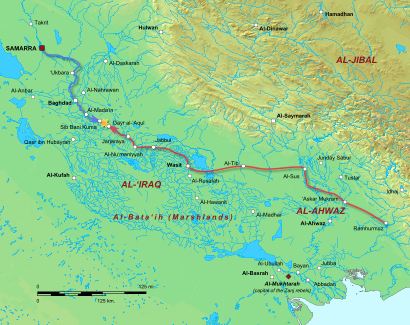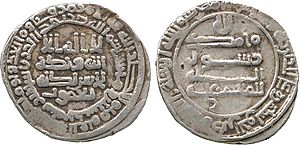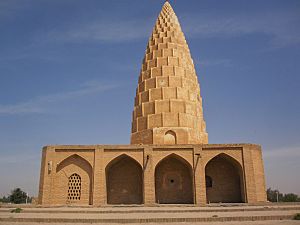Ya'qub ibn al-Layth al-Saffar facts for kids
Quick facts for kids Ya'qūb-i Layth-i SaffārPersian: یعقوب لیث صفاری |
|
|---|---|
| Amir of the Saffarid dynasty | |
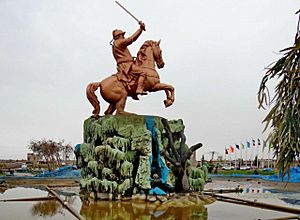
Statue of Ya'qub in Zabol, Iran
|
|
| Reign | 861–879 |
| Successor | Amr ibn al-Layth |
| Born | 840 Karnin (near Zaranj), modern-day Afghanistan |
| Died | 5 June 879 (aged 39) Gundeshapur, Khuzestan, Iran |
| Burial | Tomb of Yaghub Leys Safari, Gundeshapur, Dezful, Khuzestan, Iran |
| House | Saffarid |
| Father | Laith |
Ya'qub ibn al-Layth al-Saffar (born October 25, 840 – died June 5, 879) was a very important leader. He started the Saffarid dynasty, a powerful family that ruled a large area. Ya'qub was originally a coppersmith, which means he worked with copper. His family's kingdom was in a region called Sistan, with its main city at Zaranj (which is now in Afghanistan).
Under Ya'qub's leadership, his army conquered a huge part of what was known as Greater Iran. This area includes countries we know today like Iran, Afghanistan, Turkmenistan, Uzbekistan, Tajikistan, parts of Pakistan, and a small piece of Iraq. After he died, his brother, Amr ibn al-Layth, took over as ruler.
Contents
Early Life and Family
Ya'qub was born in 840 in a small town called Karnin. This town was near Zaranj in what is now Afghanistan. We don't know much about his family background. Some old writings were not very kind to Ya'qub because he didn't always respect the powerful Abbasid Caliphate.
Some sources even said he was a Christian or followed a different Islamic group. However, these claims were made long after he died. Most people agree that Ya'qub lived a simple life.
He was very poor when he was young and sometimes only had bread and onions to eat. His family moved to the city of Zaranj because there was fighting between different religious groups. Ya'qub became a coppersmith, which is why his family name is "Saffar" (meaning coppersmith). His brother, Amr, worked with mules.
How Ya'qub Rose to Power
Ya'qub and his brothers, Amr, Tahir, and Ali, joined a group called the ayyars. These ayyars were against the Abbasid rulers and started to control the city of Bost.
By 854, the ayyars kicked out the governor of Sistan, who was from the Tahirid dynasty. Another ayyar leader, Dirham ibn Nasr, became the ruler of Sistan in 858. But in 861, Ya'qub took over from Dirham. At this point, Ya'qub became known as an Emir, which is a high title for a ruler.
Ya'qub's Military Campaigns
Conquering Sistan and Khorasan
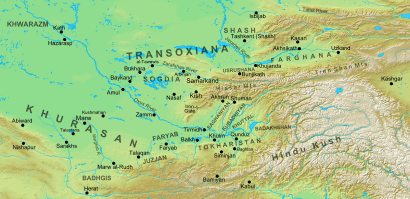
Ya'qub first became known to the Abbasid Caliphate by fighting a group called the Kharijites in his home region of Sistan. In 864, he led an army to Bost and then to Rukkaj and Zamindavar. He defeated the local ruler there, called the Zunbil, and took a lot of treasure. He also captured some of the Zunbil's family members.
Next, he defeated the Hindu Shahis and took their capital city, Kabul. He then moved against other Kharijites in northern Sistan, winning a big battle in 865. Ya'qub's victories helped to end the power of the Kharijites in the East. After a victory, one of his court members gave a speech in Arabic. Ya'qub asked why he spoke in a language Ya'qub didn't understand. So, his secretary then spoke in Persian.
Ya'qub wanted to bring back the glory of the ancient Persian kings. In 867, he sent a poem to the Abbasid caliph. The poem mentioned the Derafsh Kaviani, a legendary Persian flag, showing his ambition to rule many lands.
In 870-871, Ya'qub fought and defeated the Kharijites in Herat. He then defeated another Khariji leader named Abd al-Rahman. Ya'qub forgave Abd al-Rahman and made him a governor.
His army later conquered Ghazni, Kabul, and Bamyan from the Hindu Shahi rulers. He appointed Muslim governors in these areas. By 870 AD, he controlled all of Khorasan. Ya'qub also gained control of the Panjshir Valley, which allowed him to make silver coins. In 873, Ya'qub took over Nishapur, the capital of the Tahirid dynasty, and captured their ruler. This caused problems with the Abbasid caliph. During one battle, Ya'qub was so badly hurt that he could only eat through a tube for twenty days.
Battles in Western Iran
Ya'qub then headed west to the province of Fars. He wanted to take control of this area. What happened next is not fully clear, but Ya'qub eventually turned back to Sistan. Some say he turned back because the governor of Fars gave in to him. Others say the caliph's messengers convinced him to stop.
Later, the governor of Fars made peace with the central government and handed over tax money. Ya'qub then went to Tabaristan in 874 and fought against a leader named al-Hasan ibn Zayd. Ya'qub collected taxes in Tabaristan's capital, Amul, before moving on.
Ya'qub returned to Fars, invading it and taking over the city of Estakhr. He seized the governor's treasures there. The governor tried to stop Ya'qub, but Ya'qub defeated him in a battle near Bakhtegan Lake in August 875. Ya'qub then took control of Fars.
In 876, the Abbasid ruler offered Ya'qub control over many regions like Khurasan, Tabaristan, and Fars. He also offered to make Ya'qub head of security in Baghdad. But Ya'qub felt the offer was a sign of the caliph's weakness. He refused and said he would march to the capital instead. This offer also made the Turkish soldiers in Samarra worried, as they saw Ya'qub as a threat.
Since an agreement was not possible, the Abbasid Caliphate decided to go to war. The caliph even put a curse on Ya'qub. On March 7, 876, the caliph left Samarra and headed towards Baghdad.
Ya'qub traveled through Khuzistan and entered Iraq. The caliph's general tried to slow him down by flooding the land, but Ya'qub's army got through. He reached Wasit on March 24 and then moved towards Dayr al-`Aqul, about fifty miles from Baghdad. Ya'qub might not have expected the caliph to fight, but the caliph sent his general to stop him.
The two armies met on April 8. Ya'qub had about ten thousand soldiers. The Abbasids had more soldiers and knew the land better. The battle was fierce and lasted most of the day. Many soldiers on both sides were killed. Ya'qub himself was wounded but kept fighting. As evening came, more Abbasid soldiers arrived. They also attacked Ya'qub's army from boats on the Tigris river and set fire to their supplies, giving the Abbasids a big advantage.
Eventually, Ya'qub's army started to run away. Ya'qub and his bodyguards kept fighting but had to leave as his army retreated. The caliph had flooded the land behind Ya'qub's army, making it hard to escape. Many soldiers drowned. The Abbasids captured Ya'qub's supplies and freed political prisoners he had brought with him.
Ya'qub then left Iraq and died three years later.
Ya'qub's Beliefs and Goals
Historians still debate why Ya'qub started his campaigns. Some think he fought to spread a certain type of Islam. Others believe he was driven by his Persian identity and wanted to bring back Persian glory. Some simply think he loved military conquest. It was clear that he did not like the Abbasid caliphs.
Ya'qub's own religion has also been discussed. Many old writings were written by people who were against him. These sources sometimes showed Ya'qub as a religious troublemaker or a volunteer Sunni warrior. Some historians believe that Ya'qub and his early rulers didn't have very strong religious beliefs.
According to an old book called the Tarikh-i Sistan, Ya'qub said that the Abbasids were liars. He warned people not to trust them, pointing out how they had treated other important people who helped their dynasty.
Death of a Leader
Ya'qub suffered from a stomach illness and refused treatment. He died on Wednesday, June 5, 879, in Gundeshapur. His brother, Amr Saffari, became the new ruler. Ya'qub was known for not smiling much, and one of his enemies even called him "the anvil" because he was so tough. While one source says he had an Arab wife, most other sources claim Ya'qub never married.
Ya'qub's Lasting Impact
It was during Ya'qub's time that the Persian language became an official language again. It is said that Ya'qub himself did not know Arabic. Ya'qub is seen as a folk hero because his court helped bring back the Persian language. For two centuries before him, Arabic had been the main language in Persian lands.
Some poets even made up a family tree for Ya'qub, connecting him to the legendary Iranian king Jamshid. Ya'qub is also sometimes seen as one of the first independent rulers in Khurasan after the Islamic conquests. His military campaigns also marked the beginning of the Abbasid Caliphate losing its political power.
See also
 In Spanish: Ya'qub-i Laith Saffari para niños
In Spanish: Ya'qub-i Laith Saffari para niños
 | Sharif Bey |
 | Hale Woodruff |
 | Richmond Barthé |
 | Purvis Young |


